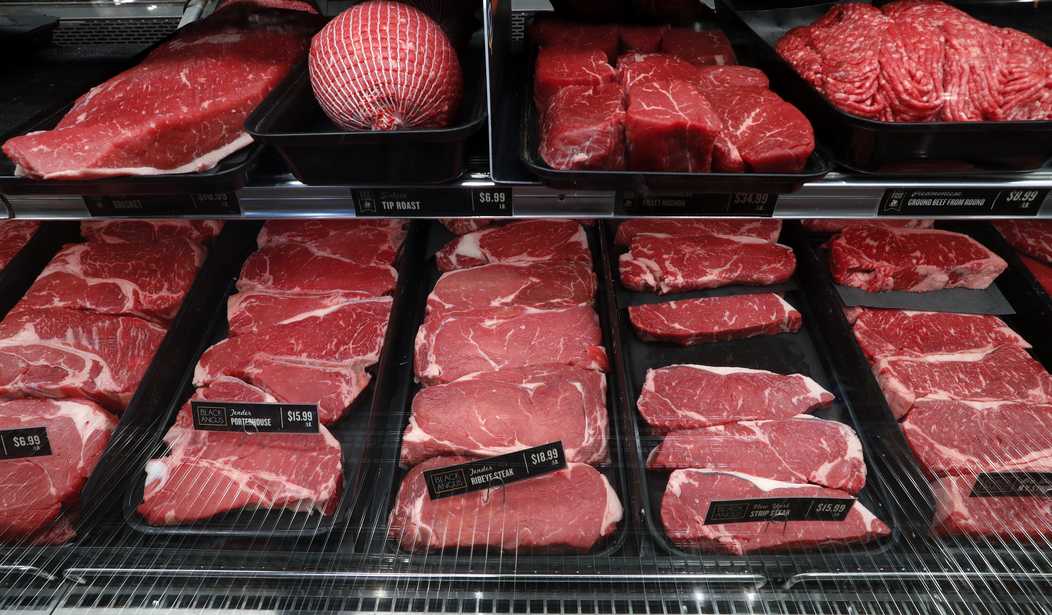Preservationists, including Bill Gates, will not like the following development: Lab-grown meat– seen as a “climate-friendly” alternative to animal agriculture– is, in fact, worse for the environment than red meat.
Last month, researchers at University of California at Davis (UCD) published an eye-opening paper finding lab-grown meat is more energy intensive and responsible for a higher carbon footprint than beef, for instance, reared by farmers and ranchers.
Animal cell-based meat, (ACBM), or lab-grown meat, they concluded, “is likely to be orders of magnitude higher than median beef production if a highly refined growth medium is utilized for ACBM production.”
ACBM “meat” has a global warming potential that is “four to 25 times greater than the average for retail beef,” the study added.
Ouch. Talk about an inconvenient truth.
Recommended
Eating wild game meat, another red meat, also has innumerable benefits–especially if you hunt it. The University of Wyoming says consuming deer, elk, and other wild game meat is recommended. Why? It’s rich in protein, B-vitamins, iron, and zinc and inherently boasts low levels of saturated fat.
Fake “plant-based” meats, in comparison, are far worse for your health. One Harvard University scientist warned, “Some of those products, even though they contain high amounts of plant-based protein, may also contain unhealthy ingredients, such as high amounts of sodium or unhealthy fats.”
The Dublin Declaration, a consortium of scientists who want objectively back in studies relating to animal agriculture, said divorcing livestock from the environment would have ruinous effects. Their declaration proclaimed livestock boost the environment by “recycling in various ways the large amounts of inedible biomass that are generated as by-products during the production of foods for the human diet.” Other inherent benefits include “carbon sequestration, improved soil health, biodiversity, watershed protection and the provision of important ecosystem services.”
Despite evidence to the contrary, preservationists continue to double down on eradicating meat from our diet and eliminating essential farming practices from existence.
Reuters recently reported the European Union approved a $1.61 billion dollar deal for the Dutch government to buy out farmers to reduce nitrogen fertilizer use–an action required and encouraged by the Environmental, Social, and Governance (ESG) movement.
The article further explained, “The Dutch need to reduce excess nitrogen levels, caused in part by decades of intensive farming, a problem that has led to courts blocking important construction projects until the issue is resolved.”
The E.U. Commission lauded the questionable move to force “voluntary” farm closures to better align with the European Green Deal. The two Netherlands schemes - LBV and LBV plus for “voluntary definitive closure of livestock husbandry sites” - are described like this:
The schemes, which can run until 27 February 2028, are open to small and medium-sized livestock farmers in the Netherlands that voluntarily close their breeding sites, provided that their current nitrogen deposition load exceed certain minimum levels.
Under the schemes, the beneficiaries guarantee that the closure of their production capacity is definitive and irreversible, and that they will not start the same breeding activity elsewhere in the Netherlands or within the EU.
Ireland also wants to follow the Netherlands’ lead on offering farmers “financial inducements” to cull their cows. Crazy. In the Emerald Isle, upwards of 200,000 animals would be sacrificed to meet unreasonable emissions goals under these net-zero policies.
The Telegraph suggested this is akin to a “massacre,” writing, “The collateral damage of net zero is now getting uncomfortably close to home. First Dutch farmers were threatened with compulsory purchases to satisfy EU emissions targets, fomenting a new revolt in the process. Now it’s Ireland’s turn, where the government is reportedly looking at plans to cull around 200,000 cows to meet its climate targets. The scheme would be a bit like voluntary redundancy, with farmers offered financial inducements to give up their cows.”
In response, Ireland’s Department of Agriculture dismissed concerns calling it a “modeling document.”
This nonsense, sadly, isn’t contained to Europe. We see climate czar John Kerry, backed by the Biden administration, entertaining these unsustainable ideas here in our country too.
“We can’t get to net-zero. We don’t get this job done unless agriculture is front and center as part of the solution,” he said at a recent climate summit.
Biden and company are leaning on a Nature Food study that claims our food system is responsible for a third of total global emissions.
Unsurprisingly, the administration announced its support for the Global Methane Pledge with Europe ahead of COP26 in fall 2021. The pledge requires signees to commit to taking “voluntary actions to contribute to a collective effort to reduce global methane emissions at least 30 percent from 2020 levels by 2030.” It claims these commitments, going off of a global target, would eliminate “0.2˚C warming by 2050.”
Policymaking should reflect the science: Regular meat is arguably better for our health and the planet than questionable alternatives.
Have no fear! Be proud–you can now eat your burger and steak in peace.

























